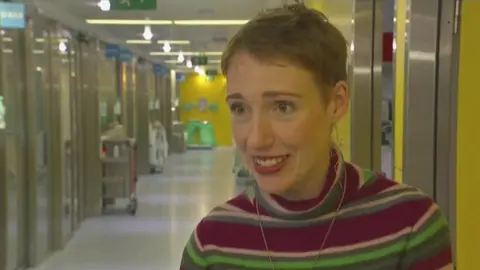Briton Audrey Schoeman revived after six-hour cardiac arrest
A British woman whose heart stopped beating for six hours has been brought back to life in what doctors have described as an "exceptional case".
Audrey Schoeman developed severe hypothermia when she was caught in a snowstorm while hiking in the Spanish Pyrenees with her husband in November.
Doctors say it is the longest cardiac arrest ever recorded in Spain.
Mrs Schoeman, who has made a near-full recovery after the ordeal, says she hopes to be hiking again by spring.
The 34-year-old, who lives in Barcelona, began having trouble speaking and moving during severe weather in the Pyrenees, later falling unconscious.
Her condition worsened while waiting for emergency services and her husband Rohan believed she was dead.
At a press conference on Thursday, Mr Schoeman told Catalan channel TV3: "I was trying to feel a pulse... I couldn't feel a breath, I couldn't feel a heartbeat."
When the rescue team arrived two hours later, Mrs Schoeman's body temperature had fallen to 18C.
Upon arrival at Barcelona's Vall d'Hebron Hospital, she had no vital signs.
But the low mountain temperatures which made Mrs Schoeman ill also helped to save her life, her doctor Eduard Argudo has said.
"She looked as though she was dead," he said in a statement.
"But we knew that, in the context of hypothermia, Audrey had a chance of surviving."
Hypothermia had protected her body and brain from deteriorating while unconscious, Mr Argudo said, despite also bringing her to the brink of death.
He added: "If she had been in cardiac arrest for this long at a normal body temperature, she would be dead."
 Reuters
ReutersIn a race against time, doctors treating Mrs Schoeman turned to a specialised machine capable of removing blood, infusing it with oxygen and reintroducing it to the patient.
Once her body temperature had reached 30C, they used a defibrillator to jump-start her heart some six hours after emergency services were contacted.
Mrs Schoeman was released from hospital 12 days later, with only some lingering issues with the mobility and sensitivity of her hands due to the hypothermia.

What happens to the body in very cold temperatures?
There have been other cases of adults and children surviving for long periods in very cold temperatures, then being slowly re-warmed in hospital using specialist equipment.
But there is always the risk of brain damage.
Normal body temperature is around 37C (98.6F). When it goes below 35C, shivering, confusion and tiredness can set in. Below 32C, people can pass out altogether and the heart can stop.
In Mrs Schoeman's case, although extremely dangerous, the cold proved to be a blessing.
The freezing temperatures appear to have slowed down her heart, blood pressure and breathing to extremely low levels, while protecting the brain from damage.
How long her heart stopped for is not clear - she may still have had some circulation, although not detectable.
Normally, after about an hour without the heart beating, even in the cold, brain damage would have occurred.

"We were very worried about any neurological damage," Mr Argudo added.
"Given there are practically no cases of people who have had their heart stop for so long and been revived."
Speaking after her recovery, Mrs Schoeman said she had no memory of the six hours.
"I didn't really know what was going on in my first day or two that I woke up in intensive care," she said.
"But, since then, I've been trying to read more, obviously learning more about hypothermia and it feels really incredible that I survived it."
Mrs Schoeman said she was lucky to be alive and paid tribute to hospital staff.
"It's like a miracle except it's all because of the doctors," she said.
She added that it was likely she would not return to the mountains this winter.
"But I hope that in spring we will be able to start hiking again. I don't want this to take away that hobby from me," she said.
